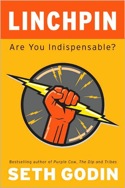
There’s nothing like reading a book about getting off your duff, especially when it’s written by someone who appears to have no problem doing just that. Seth Godin’s latest book, Linchpin: Are You Indispensable?, is the antidote to mediocrity, excuses and procrastination. “Every organization needs a linchpin,” says Godin, “the one person who can bring it together and make a difference.”
The enemy of a linchpin is the “lizard brain.” When linchpins overcome the obstacles that stand in their way of creating and doing, the lizard brain is silenced. For church communicators, the lizard brain manifests itself in a myriad of musings. Consider:
- The monotony of weekly repetition
- Attempting to please the boss
- Social media distractions
- Praying for tools/technology you don’t have
- Doing what you did last week/month/year
- Seeking attention instead of transformation
Seth borrows liberally from Steven Pressfield’s The War of Art. Pressfield calls the enemy “The Resistance.”
By forcing myself to do absolutely no busywork tasks in between bouts with the work, I remove the best excuse the resistance has. I can’t avoid the work because I am not distracting myself with anything but the work. This is the hallmark of a productive artist. I don’t go to meetings. I don’t write memos. I don’t have a staff. I don’t commute. The goal is to strip away anything that looks productive but doesn’t involve shipping.
“Shipping” is what Linchpin (and The War of Art) is all about. Shipping is what makes an idea believable. If we don’t ship, there is nothing to show for our thinking, planning or creating.
Godin is also very adamant about building platforms. In the context of church communities, we could learn a lot from this concept. By thinking of “church” as a type of platform—instead of a product or outcome—our thinking could shift from seeing church as an end point to seeing it as a starting point.
I’m trying to sell you on the idea of building a platform before you have your next idea, to view the platform building as a separate project from spreading your art. You can work on the platform every day, do it without facing the resistance. As the platform gets bigger and stronger, you get to launch each idea a little farther uphill. It’s not easy to get to this point. A valuable platform is an asset, one that isn’t handed to you. It takes preparation and effort to set the world up so that your ideas are more likely to ship. But that’s effort that the resistance won’t be so eager to sabotage. By separating the hard work of preparation from the scary work of insight, you can build an environment in which you’re more likely to ship.
Godin includes a manifesto written by Bre Pettis and Kio Stark that does a nice job summarizing the outlook of a linchpin:
- There are three states of being. Not knowing, action and completion.
- Accept that everything is a draft. It helps to get it done.
- There is no editing stage.
- Pretending you know what you’re doing is almost the same as knowing what you are doing, so accept that you know what you’re doing even if you don’t and do it.
- Banish procrastination. If you wait more than a week to get an idea done, abandon it.
- The point of being done is not to finish but to get other things done.
- Once you’re done you can throw it away.
- Laugh at perfection. It’s boring and keeps you from being done.
- People without dirty hands are wrong. Doing something makes you right.
- Failure counts as done. So do mistakes.
- Destruction is a variant of done.
- If you have an idea and publish it on the Internet, that counts as a ghost of done.
- Done is the engine of more.




Paul Hickernell
June 8, 2010
Thanks for the walk-thru. I’m off to get the book. I am curious on your take on manifesto point three; no editing stage. Help me understand.
Torrey
June 10, 2010
Paul,
I think he may be referring to over-analyisis. We can spend forever trying to edit something before we release it to make it perfect. Create something and release it and edit as you go to prevent stagnation.
Paul Hickernell
June 14, 2010
Thank you. That makes sense to me. Have a great day.